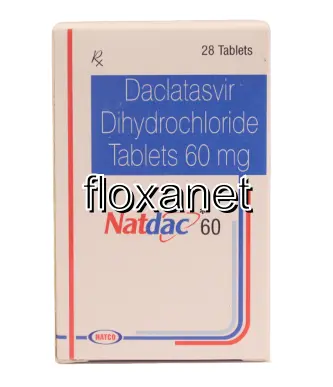Shop Daclatasvir Online in Canada
| Package | Dosage | Price | Price per Dose | |
|---|---|---|---|---|
| Dosage: 60mg | ||||
| 56 pill | 60mg | CAD1,729.03 | CAD30.87 | |
| 28 pill | 60mg | CAD1,024.53 | CAD36.59 | |

Daclatasvir Description
Introduction to Daclatasvir
Daclatasvir is an advanced antiviral medication used primarily in the treatment of Hepatitis C virus (HCV) infections. It belongs to a class of drugs known as NS5A inhibitors, which target a specific part of the virus's lifecycle. By inhibiting the NS5A protein, Daclatasvir effectively disrupts viral replication, helping to reduce the viral load in patients. This medication is often prescribed as part of combination therapy alongside other antiviral agents to enhance treatment efficacy.
Effectiveness and Benefits
Many patients have reported significant improvements while using Daclatasvir. Its high potency against various HCV genotypes makes it a versatile choice for treatment. The medication is appreciated for its rapid action and ability to achieve sustained virologic response (SVR), which is considered a cure for hepatitis C. Due to its targeted mechanism, Daclatasvir usually results in fewer side effects compared to older treatments like interferon. Patients often experience fewer symptoms and better tolerability, leading to increased adherence to the prescribed therapy.
Usage and Administration
Typically, Daclatasvir is administered orally in the form of tablets. The standard dose is often 60 mg once daily, but this can vary depending on the patient's genotype, age, liver condition, and whether it is combined with other medications. It is crucial to follow the healthcare provider's instructions precisely. Usually, Daclatasvir is prescribed for 12 to 24 weeks, depending on the treatment plan. Patients are advised to take the medication at the same time each day to maintain consistent blood levels and maximize effectiveness.
Side Effects and Precautions
While Daclatasvir is generally well-tolerated, some patients may experience side effects. Mild symptoms such as fatigue, headache, nausea, or sore throat are commonly reported. Serious adverse effects are rare but can include liver enzyme elevations or signs of liver injury, especially in patients with pre-existing liver conditions. It is essential for patients to undergo regular monitoring during treatment. Additionally, Daclatasvir can interact with other drugs, such as certain anticonvulsants or medications for other chronic conditions, so proper medical guidance is critical.
Considerations for Use
Before starting Daclatasvir, patients should inform their healthcare provider about all current medications and underlying health issues. Pregnant or breastfeeding women should discuss potential risks, as safety data are limited in these populations. Since the medication impacts viral replication, adherence to the prescribed regimen is vital to prevent resistance development. Patients are also encouraged to maintain a healthy lifestyle, avoid alcohol, and attend all medical checkups to ensure the best possible outcome.
Conclusion
Daclatasvir represents a significant advancement in hepatitis C treatment. Its targeted action, high efficacy, and generally manageable side effect profile make it a preferred option for many patients. Proper medical oversight and adherence to the treatment plan are essential for achieving optimal results and minimizing risks. Overall, Daclatasvir offers hope for those affected by the virus, contributing to improved health and quality of life.
